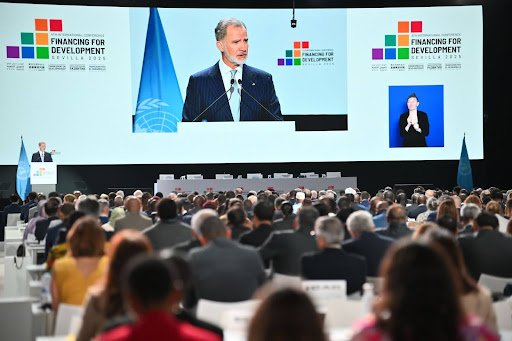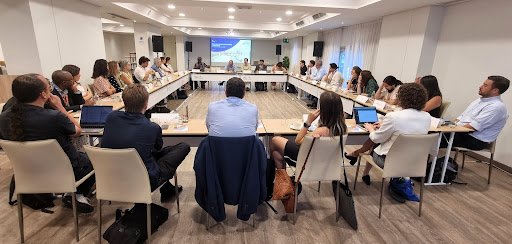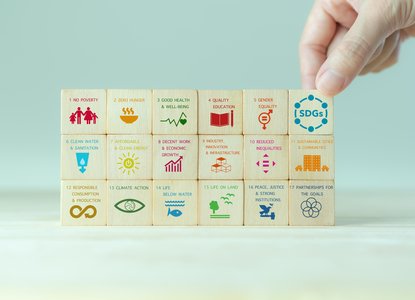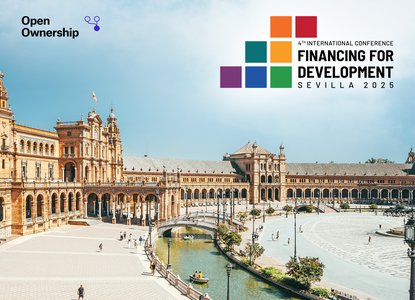Building momentum: Beneficial ownership commitments at FfD4 and the path forward

The King of Spain, Felipe VI, officially opened the 4th International Conference on Financing for Development in Seville, Spain, on 30 June 2025. Photo: UNECA
Last week in Seville, the Fourth International Conference on Financing for Development (FfD4) agreed significant new commitments on beneficial ownership transparency (BOT) to tackle illicit financial flows and improve domestic resource mobilisation. This is an important milestone for the global transparency agenda and creates an opportunity for Open Ownership and our partners to ensure these commitments are effectively implemented and deliver results.
A new global commitment to beneficial ownership transparency
Paragraph 28(g) of the Compromiso de Sevilla (Sevilla Commitment) marks a step forward in international recognition of the role of BOT as a tool to support public resource mobilisation, and the need for both domestic and international action. It affirms the commitment of participating United Nations member states to:
- “Implement effective domestic beneficial ownership registries with high-quality, and standardized information”;
- “Enhance mechanisms for information exchange between national beneficial ownership registries and consider the feasibility and utility of a global beneficial ownership registry”;
- “Facilitate the exchange of knowledge and best practices, and provide assistance to developing countries in implementing these transparency standards”.
Notably, this is the first major internationally agreed document to explicitly reference a “global beneficial ownership registry” – its inclusion is a major signal of political commitment to follow the money across borders, and a recognition of the urgent need for transnational solutions to advance effective taxation and tackle tax abuse, corruption, and other illicit financial flows.
What this means: Three big steps forward
Implemented well, this commitment could move the world forward on BOT in three critical ways:
1. Creating stronger domestic registries
The commitment to implement registries with high-quality, standardised beneficial ownership information lays the groundwork for more impactful BOT reforms. In particular, the reference to standardised data – although not further defined in the text – acknowledges the importance of aligning beneficial ownership information across different national registries to enable data connection and comparability. This is often crucial for using beneficial ownership registries to track the money in cases of suspected tax abuse and corruption.
2. Improving international data sharing
The commitment to enhancing the international exchange of beneficial ownership data – and exploring the implementation of a global beneficial ownership registry – is a recognition that national datasets alone are insufficient for tracking the flow of money across borders and driving action to prevent tax abuse. While the text is silent on which actors should be sharing data, and discussions in Seville highlighted notable variations in stakeholders’ assumptions about which actors should have access to this data, the commitment to improving international data sharing is a welcome foundation to take forward specific actions at bilateral, regional, and international levels.
3. Providing assistance and sharing knowledge
BOT reforms are still a relatively new field, and further capacity is needed in many contexts to enable effective implementation. The FfD4’s commitment to facilitate knowledge exchange and support developing countries to implement reforms recognises this. Such reforms also carry an initial financial cost. At a time when official development assistance budgets are shrinking, it is crucial to prioritise the delivery of reforms and beneficial ownership registries in a manner that can support ongoing domestic resource mobilisation.
A moment of opportunity: (Re)thinking a global beneficial ownership registry
We see this moment as an opportunity to move the conversation forward, both politically and technically. Politically, there is still a need to build broad support for the concept of a global beneficial ownership registry, and from our conversations with government and civil society actors, it is clear that there are a wide range of assumptions about what such a registry could or should look like.
We urge stakeholders to frame these conversations around the outcomes that a global beneficial ownership registry is intended to deliver: enabling global understanding of beneficial ownership networks (that is, the relationships between legal entities, individuals, and assets) to stop tax abuse, end corruption, and support the mobilisation of public resources to fund sustainable development.
There are also significant practical questions that need to be addressed, and providing several options (rather than a single “best” solution) will be helpful to ensure that overly focusing on technical elements does not hold up progress. So far, questions raised directly to our team have included who should host the registry, how it would work, what entities and/or assets it should cover, and who should have access to the information it would hold.
There are a range of possible options to implement a global beneficial ownership registry. Drawing from seven years of research and five years of operating a pilot global beneficial ownership registry, it is clear that a global registry doesn’t necessarily have to be a single, centralised platform where data is stored as well as accessed. Indeed, decentralised approaches that leverage data already held in national registries are likely to be more feasible to implement – both in terms of cost, efficiency, and respecting data protection laws.
Technology already exists to connect beneficial ownership information and other similar types of data across borders, and there are concrete case studies and lessons to learn from existing regional and international data-sharing initiatives. What’s needed now is a coordinated effort and high ambition.
Open Ownership’s next steps

Open Ownership convened partners and government representatives during FfD4 to speak about the future of BOT and options for a global beneficial ownership registry.
The success of FfD4 will depend on all signatories now investing time and effort in designing a workable, funded plan to deliver what has been agreed in Seville. Those of us outside of government can support this by putting forward practical suggestions on where to go next, and this is exactly what Open Ownership, alongside other interested groups, intends to do. Open Ownership convened key organisations and government representatives during FfD4 to discuss Where next on BOT? This was an opportunity for partners to start discussing options for a potential global beneficial ownership registry, and surface ways forward to strengthen national registries and international data sharing.
To continue taking this work forward during the coming months, Open Ownership will:
- Convene key stakeholders – including governments, multilateral institutions, and civil society – to explore feasible and ambitious models for transnational beneficial ownership data access.
- Champion regional pilots as stepping stones and testing grounds for global solutions, particularly leveraging efforts already underway to improve exchange of beneficial ownership information in the European Union and planned work to strengthen sharing of information for tax purposes in Latin America.
- Leverage Sevilla Platform for Action initiatives to advance discussions on implementing the BOT commitments from FfD4, particularly the one launched by the governments of Brazil and Spain to drive fairer and more progressive tax systems, where beneficial ownership information is of crucial importance in enforcing proper wealth taxation.
While Open Ownership’s focus is on the BOT commitments that are part of a much broader FfD agenda, we also recognise the connections between BOT and a range of FfD issues, such as driving sovereign debt sustainability and improving international tax cooperation. These issues will critically shape countries’ ability to raise and retain revenues for development efforts. As we take the next steps on BOT, we do so in the context of this broader global effort – committed to supporting sustainable development that delivers impact for citizens everywhere.
Publication type
Blog post
Country focus
Spain
Sections
Implementation
Open Ownership Principles
Central register

